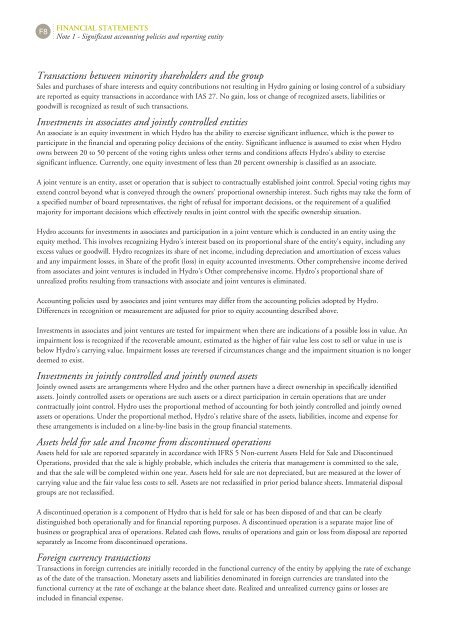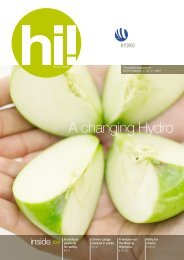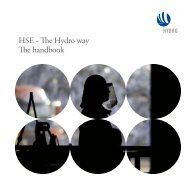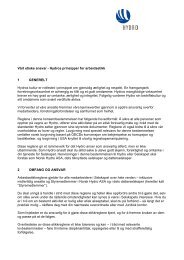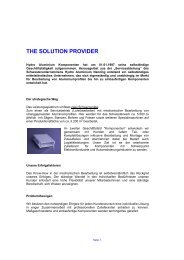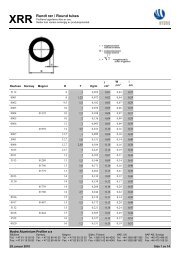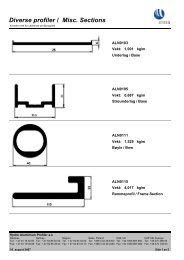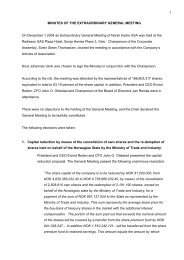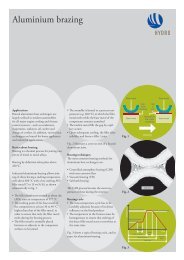Hydro Annual Report 2011b
Hydro Annual Report 2011b
Hydro Annual Report 2011b
Create successful ePaper yourself
Turn your PDF publications into a flip-book with our unique Google optimized e-Paper software.
F8<br />
FINANCIAL STATEMENTS<br />
Note 1 - Significant accounting policies and reporting entity<br />
Transactions between minority shareholders and the group<br />
Sales and purchases of share interests and equity contributions not resulting in <strong>Hydro</strong> gaining or losing control of a subsidiary<br />
are reported as equity transactions in accordance with IAS 27. No gain, loss or change of recognized assets, liabilities or<br />
goodwill is recognized as result of such transactions.<br />
Investments in associates and jointly controlled entities<br />
An associate is an equity investment in which <strong>Hydro</strong> has the ability to exercise significant influence, which is the power to<br />
participate in the financial and operating policy decisions of the entity. Significant influence is assumed to exist when <strong>Hydro</strong><br />
owns between 20 to 50 percent of the voting rights unless other terms and conditions affects <strong>Hydro</strong>'s ability to exercise<br />
significant influence. Currently, one equity investment of less than 20 percent ownership is classified as an associate.<br />
A joint venture is an entity, asset or operation that is subject to contractually established joint control. Special voting rights may<br />
extend control beyond what is conveyed through the owners' proportional ownership interest. Such rights may take the form of<br />
a specified number of board representatives, the right of refusal for important decisions, or the requirement of a qualified<br />
majority for important decisions which effectively results in joint control with the specific ownership situation.<br />
<strong>Hydro</strong> accounts for investments in associates and participation in a joint venture which is conducted in an entity using the<br />
equity method. This involves recognizing <strong>Hydro</strong>'s interest based on its proportional share of the entity's equity, including any<br />
excess values or goodwill. <strong>Hydro</strong> recognizes its share of net income, including depreciation and amortization of excess values<br />
and any impairment losses, in Share of the profit (loss) in equity accounted investments. Other comprehensive income derived<br />
from associates and joint ventures is included in <strong>Hydro</strong>'s Other comprehensive income. <strong>Hydro</strong>'s proportional share of<br />
unrealized profits resulting from transactions with associate and joint ventures is eliminated.<br />
Accounting policies used by associates and joint ventures may differ from the accounting policies adopted by <strong>Hydro</strong>.<br />
Differences in recognition or measurement are adjusted for prior to equity accounting described above.<br />
Investments in associates and joint ventures are tested for impairment when there are indications of a possible loss in value. An<br />
impairment loss is recognized if the recoverable amount, estimated as the higher of fair value less cost to sell or value in use is<br />
below <strong>Hydro</strong>'s carrying value. Impairment losses are reversed if circumstances change and the impairment situation is no longer<br />
deemed to exist.<br />
Investments in jointly controlled and jointly owned assets<br />
Jointly owned assets are arrangements where <strong>Hydro</strong> and the other partners have a direct ownership in specifically identified<br />
assets. Jointly controlled assets or operations are such assets or a direct participation in certain operations that are under<br />
contractually joint control. <strong>Hydro</strong> uses the proportional method of accounting for both jointly controlled and jointly owned<br />
assets or operations. Under the proportional method, <strong>Hydro</strong>'s relative share of the assets, liabilities, income and expense for<br />
these arrangements is included on a line-by-line basis in the group financial statements.<br />
Assets held for sale and Income from discontinued operations<br />
Assets held for sale are reported separately in accordance with IFRS 5 Non-current Assets Held for Sale and Discontinued<br />
Operations, provided that the sale is highly probable, which includes the criteria that management is committed to the sale,<br />
and that the sale will be completed within one year. Assets held for sale are not depreciated, but are measured at the lower of<br />
carrying value and the fair value less costs to sell. Assets are not reclassified in prior period balance sheets. Immaterial disposal<br />
groups are not reclassified.<br />
A discontinued operation is a component of <strong>Hydro</strong> that is held for sale or has been disposed of and that can be clearly<br />
distinguished both operationally and for financial reporting purposes. A discontinued operation is a separate major line of<br />
business or geographical area of operations. Related cash flows, results of operations and gain or loss from disposal are reported<br />
separately as Income from discontinued operations.<br />
Foreign currency transactions<br />
Transactions in foreign currencies are initially recorded in the functional currency of the entity by applying the rate of exchange<br />
as of the date of the transaction. Monetary assets and liabilities denominated in foreign currencies are translated into the<br />
functional currency at the rate of exchange at the balance sheet date. Realized and unrealized currency gains or losses are<br />
included in financial expense.


